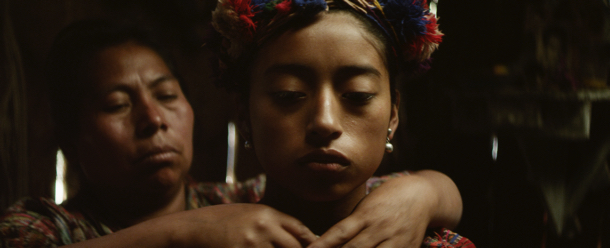
Director/Writer: Jayro Bustamante
Cast: María Mercedes Coroy, María Telon, Manuel Antun, Justo Lorenzo
Guatemala/France Drama 91min
Writer-director Jayro Bustamante makes an assured feature debut with IXCANUL VOLCANO, a film as disciplined as it is downbeat in its study of the working routines and local superstitions that make up life at a coffee plantation below a dormant volcano in the midwestern highlands of Guatemala. The film world-premieres in-competition at the 65th Berlin International Film Festival this week, and is not unlike another South American predecessor, THE MILK OF SORROW, which may provide two good omens: that film’s director, Peruvian Claudia Llosa, is on this year’s jury, while the film itself won the top prize upon bowing here in 2009.
17-year-old María (María Mercedes Coroy) is to be married off to Ignacio (Justo Lorenzo), the farm’s significantly older, city-dwelling foreman. Ignacio arrives with a smile that disarms any would-be suspicions on the part of María’s family – all of whom are unilingual, Kaqchikel-speaking indigenous Mayans, whose general lack of education leaves them open to misinformation and exploitation: though not especially zealous in his abuse of power, Ignacio nevertheless demonstrates hesitance in allowing María’s family to speak for themselves when communicating on their behalf to Spanish-speaking authorities – firstly to a health inspector and secondly, much later, to the police.
María and her parents, Juana (María Telón) and Manuel (Manuel Antún), are without electricity and running water, while a snake infestation is a permanent source of danger to the cattle they keep. By way of a central narrative tension, the film comes into its own when María is – inconveniently for her, though a little too conveniently for the purposes of plot – impregnated by local lad Pepe (Marvin Coroy), who is much closer to her own age. Dependent upon spiritual healing rather than actual medicine, an abortion is out of the question, and the film begins to unravel as tensions build around María’s fate.
Bustamante’s film is a largely straightforward affair that benefits from more suggestive currents. Opening with a scene in which María and her mother feed rum to their pigs in order to enable mating, they soon after kill one of the animals to eat. Priming the drink-fuelled sex by which María herself is later impregnated, the pig’s fortune doesn’t bode well for our protagonist (who, alluringly played by non-professional Mercedes Coroy, is on the more sensibly talky and less irritating side of ambiguous arthouse heroine).
Not least among IXCANUL VOLCANO’s symbolic threads is the volcano itself, whose peak is never shown and whose ashen slopes are caught only fleetingly in the background of Luis Armando Arteagas’ deep-focus cinematography – which is rich in jungle greens and earthen hues. Suggesting a kind of latent pit of doom that threatens, like an unwanted baby, to come forth at any moment, the volcano smoulders and grumbles from deep within – as if asking for an outlet by which to air its stress, which the filmmakers fittingly never allow. MICHAEL PATTISON
SILVER BEAR AWARD AT BERLINALE 5-15 FEBRUARY 2015 | NOW SCREENING DURING LONDON FILM FESTIVAL 2015